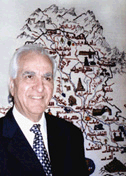Tourism on a limited budget
My article in the last issue was entitled Space Tourism: New Prospects For The Rich. I will now discuss tourism prospects for those on limited incomes - 99 percent of the world's population.
Flying over tourist areas on land is similar to space travel through planets and galaxies, because of their great diversity. One can develop different types of tourism to match the needs of people with limited incomes such as old people, the handicapped or those without an income This article discusses a form of tourism which is a total contrast to the space travel for those with unlimited income.
There are various types of tourism and one can always develop new forms in order to allow the inhabitants of this planet to rest and work. Tourism makes cultural exchanges possible and leads to an understanding between people of the same city, the same country and neighbouring states. Nowadays, tourism and travel have become a human need, similar to food, accommodation, clothing, education and health.
There are at least six categories of tourism: entertainment tourism, spiritual tourism, medical tourism, cultural tourism, economic tourism and environmental tourism, with variations in each category. Tourism for people with limited incomes must meet the standards of conventional tourism if we really believe in social justice. For that, an effective organisational and institutional structure must be in place.
Types of tourism
· Social Tourism
Providing holidays for poor and socially isolated families was developed in Europe under the term "Social Tourism". France is the most advanced country in this field. Social tourism takes various forms: employers or the state can subsidise their employees through holiday centres, state grants and voucher schemes. In France, for example, people whose income tax is below a certain threshold receive vouchers according to their disposable income, which can pay for rail, plane or boat tickets. They can also spend them in 135,000 different entertainment centres. Poland is planning a similar system as long as the vouchers are redeemed inside the country to encourage internal tourism.
Is there a real need for social tourism in Europe? Would it be a luxury? And what about developing countries, if the large industrialized countries implement such programs? The answer is that social tourism developed in response to a pressing need which still exists today. The statistics provide the evidence. In Great Britain, they indicate that more than a third of the population have no financial resources to pay for holidays. In 2002, 20% of families with both parents, and nearly 60% of single-parent families, were unable to enjoy a one week holiday per year.
If this is the case in the developed world what about developing countries? The feeling of responsibility towards the nation must be the principal motivation of states, large or small, to create a happy society.
· Family Tourism
This type of tourism is related to social tourism, but we prefer to treat it separately since families are diverse in their composition, culture, age and incomes and one cannot treat them as a homogeneous entity. It is also necessary to take into account other variables in the development of projects for family tourism. For example, it should be known if the family is supported by only one relative; if the parents are pensioners with limited incomes, if they have children and of which age, if the parents or one of them provides for the needs for the children etc.
The importance of these details relates to two fundamental aspects: the comprehension of the needs of the families according to their composition and characteristics, makes it possible to offer tourist products which are suitable for them. Tourism for elderly or retired people differs completely from that of families with children. The need of the first group for calm and rest, contrasts with that of the children who need different forms of entertainment, even if they both are located in the category of people with limited incomes. This characterisation makes it necessary to create appropriate holiday resorts. The second aspect consists of creating and developing establishments and charities to support these families in order to consolidate them and make society more connected and cooperative, and to allow the greatest number of these bodies to work in this field, instead of leaving all the work to the state. The United Kingdom is a country in the forefront of voluntary charity work, with many associations and foundations.
· Tourism for people with special needs
Despite the fact that physical or mental handicaps can affect any person regardless of his or her financial situation, the situation gets complicated for people if they are both handicapped and on low incomes. Tourism for people with specific needs is a vast and very complex subject and needs separate treatment. (It will be discussed in the next issue). Its difficulty comes from the multiplicity of bodies involved: parents, patrons, companies offering holidays, laws and regulations defining and protecting disabled people etc which differ in different countries. Related to these issues are the facilities provided by transport companies, dynamism and effectiveness of medical associations specific to each type of handicap and their degree of sophistication through the publication of information booklets relating to various disabilities. The tolerance of society and its provisions for people with special needs is also an issue. In the United Kingdom, for example, the National Autistic Society publishes booklets annually relating to holidays for people with special needs. Among the successful examples of services provided by the enlightened society is the "I Count" card, similar to an identity card, consisting of the name of the handicapped person and his number. It enables the card holder to have access to leisure centres (amusement parks and zoos) at a preferential price and without waiting.
· Tourism of opportunity
The search for holidays, out of season, or at special times, such as during periods of political or natural crises, buying tickets through the Internet or during the time when resorts and tourism villages are not busy, gets you a 50 percent reduction. This enabled people on limited incomes to benefit from a holiday as in the case of the Iraqi community travelling to Syria or Lebanon as a tourist group. They can stay three nights in five- star hotels in East Beirut for $100 dollars. The irony is that their circumstances enabled poor people to profit from holidays of which they did not even dream. Hotels and tourism agencies could not have offered their services at such low prices if the country was doing well economically and did not have security problems.
· Tourism of caravans and camp-sites
This type of tourism, with its freedom and simplicity, attracts people from all social groups. One can support this type of tourism by offering attractive spaces, with beautiful natural landscapes, quiet and clean. They should be equipped with the essentials: electricity, water, toilets and showers. The costs of accommodation in this type of tourism are very low.
Sponsors
International conventions, such as the UN convention related to the rights of children, and the Universal Declaration of Human Rights indirectly support the view that rest and leisure are a social right. Countries vary in the degree to which they sponsor tourism and there is an increasing general awareness of this subject on the global level. In Great Britain, not been able to take annual holidays is considered a criterion of poverty. The Children's Law of 2004 stressed that leisure emanating from tourism is essential for child health.
The characterisation of tourism opens a vast horizon for those who want to take part in the development of various forms of tourism: associations, charities, government agencies, NGO's and volunteers.
Expected benefits of different forms of tourism
The benefits of tourism are very significant for individuals as well as families, the environment and the economy. Experts and decision makers estimate that leisure and tourism have a positive impact on people with limited income including rest, relaxation from tension, improvement of social relations, widening of the cultural horizon, improvement of mental health, increase in self-confidence, and introducing prospects for work, production and creativity. Internal tourism encourages the development of infrastructure and the total economic development of the country.
Finally, I would like to thank the Family Holidays Association (www.familyholidayassociation.org.uk) and the National Autistic Society (www.autism.org.uk) for providing me with vital information for this article. I also want to remind readers of the saying: "Love for your brother what you love for yourself."
May God guide us to success
A. S. Shakiry
|

